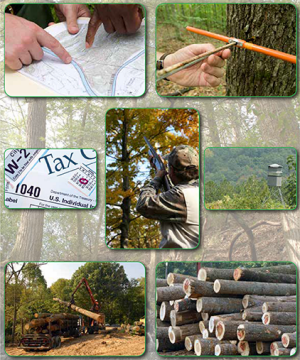Consulting Forester Directory

The Tennessee Department of Agriculture Division of Forestry sponsors a Consulting Forester Directory in cooperation with the Tennessee Chapter of the Association of Consulting Foresters (ACF). The purpose of the program is to promote adoption of sound forest management practices on private forest lands in Tennessee and to encourage landowners to utilize private consultants in the ongoing management of their woodland acres.
The Division of Forestry is responsible for promoting sound forest management on private lands for the production of wood products and forest-related benefits for the public good. Division personnel are available to furnish information, advice, and limited assistance about forest protection, management, and reforestation. However, as a public agency, the Division’s role is to assist with forest management planning, but not one of managing private lands or providing comprehensive forest land management services.
Management of private forest lands is largely the role of the private sector. Consulting foresters are private business-persons who are educated and experienced in the forestry profession. They offer a wide variety of forest management services to landowners on a fee or contract basis. As such, consulting foresters function as both technical advisors and legal agents in representing landowners.
These professional foresters help landowners achieve their goals in managing family woodlands. Please review the sections below for guidance on selecting the best professional forester for your needs.
The information contained herein is current and correct as to what has been provided to the Division of Forestry by the consulting forester. The Division of Forestry does not endorse or recommend one consultant over another. The information contained in this directory is provided as a service to private landowners and should be verified before using.
A consultant’s livelihood is based on satisfied clients. The consulting forester you hire should serve you and represent your best interests in all matters concerning your woodlands.
Consultants’ fees may be based on the amount of time required to perform the job, the acreage of woodland involved, or a contract price based on a proportion of the revenues obtained from the sale of timber. Cost should be one consideration in choosing a consultant, but their experience, performance, record, and understanding of your objectives is equally important. There is no single best way to manage forestland; so, choose a consultant who understands your personal needs and with whom you feel comfortable. Time spent reviewing consultants’ qualifications and references is a wise investment.
The knowledge and experience of consulting foresters vary widely. Determine a consultant’s qualifications from personal interviews, and obtain references from several clients. Obtain this and other information, including cost estimates, from several consulting foresters before choosing one to handle your forestry affairs.
There are no legal standards governing consultants’ work in Tennessee; however, the Association of Consulting Foresters (ACF) and the Society of American Foresters (SAF) each has membership criteria, including the prerequisite of a professional forestry education. Membership in one or more of these organizations is an indication of a consultant’s professional commitment.
Both organizations have adopted a formal code of ethics, or standards of conduct, which guide the professional performance of ACF and SAF members. Copies of the ACF and SAF codes of ethics are found on their respective websites.
Once you have selected a consultant, you should sign a contract or written agreement. It should list specific services to be performed, how they will be performed, and specifies that the forester or landowner will be responsible for that part of the project. For example, if property boundaries are to be marked, specify who will search the records for property descriptions. If timber is to be sold, determine whether it will be by competitive bid, negotiated bid, or contract logging. Include how often the consultant will check during harvesting to assure that the job is done correctly and how the volume of timber sold will be determined and by whom. If post-harvest cleanup is part of the job, specify who may receive proceeds from possible cordwood sales from the tops of trees after logging. These are just a few of the services that should be addressed in a contract or written agreement.
It is the responsibility of the State to encourage excellence in forestry. Therefore, the Department of Agriculture Division of Forestry publishes a directory of only those individuals or firms which employ professional foresters whose primary livelihood is derived from forestry and forestry-related consulting work, are graduates of forestry schools accredited by or affiliated with the Society of American Foresters, and request inclusion on the directory. Consultants and consulting firms that own or are directly employed by primary wood using industries or that buy, trade, or broker timber shall not be eligible for inclusion on the list
If you are a consulting forester who meets these criteria and would like to have your contact information added, changed, or removed from this directory, please contact John Woodcock.
John.Woodcock@tn.gov or 615-837-5438